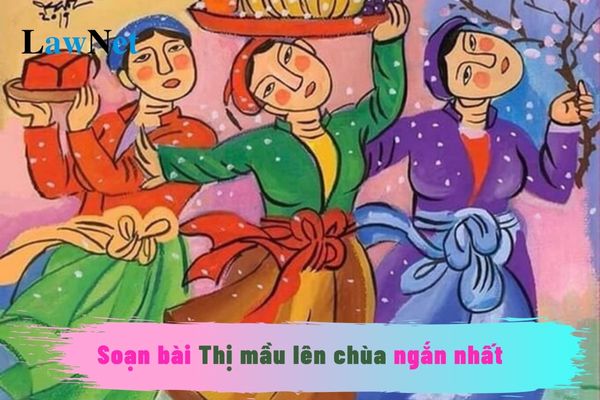Vietnam: What are the guidelines for preparing the briefest lesson "Thị Mầu Lên Chùa"? Can 10th-grade students participate in acting activities at school?
What are the guidelines for preparing the briefest lesson "Thị Mầu Lên Chùa"?
10th-grade students can refer to the following sample briefest lesson "Thị Mầu Lên Chùa":
|
Guidelines for preparing the briefest lesson "Thị Mầu Lên Chùa" * Main Content: |
*Note: The information is for reference purposes only./.

What are the guidelines for preparing the briefest lesson "Thị Mầu Lên Chùa"? Can 10th-grade students participate in acting activities at school? (Image from Internet)
Are 10th-grade students in Vietnam required to comply with intellectual property rights and avoid plagiarism after studying the Literature subject?
Under Section 4 of the General education program in Literature attached to Circular 32/2018/TT-BGDDT, after studying literary texts in the 10th-grade Literature curriculum, students are required to:
- Skillfully write argumentative and explanatory texts on topics related to life and career orientation; write according to procedures, combining expressive methods, types of argumentation, and artistic elements; have independent ideas on a social issue.
- Be able to write argumentative and informational texts on relatively complex topics; argumentative texts require analysis, evaluation, and comparison of literary work values; discuss issues appropriate to the audience nearing adulthood, demanding relatively complex structures and argumentation styles, gathering evidence from various sources; explanatory texts on scientific issues in the form of a properly formatted research report; comply with intellectual property rights and avoid plagiarism.
- Writing should express emotions, attitudes, experiences, and personal ideas regarding issues raised in the text; show a distinct perspective, way of thinking, and way of life.
- Be aware of discussing issues with opposing views; have an open-minded and cultured attitude towards debate; have the ability to listen to presentations and evaluate the content and expressive form of the presentation; be enthusiastic about expressing personal opinions and character in debates; confidently present scientific issues persuasively. Speak and listen flexibly; grasp the methods and procedures for conducting a debate.
Thus, according to regulations, 10th-grade students must adhere to intellectual property rights and avoid plagiarism after studying the Literature subject.
Can 10th-grade students in Vietnam participate in acting activities at school?
Under Article 34 of the lower secondary school, upper secondary school and multi-level school charter attached to Circular 32/2020/TT-BGDDT, the duties of upper secondary school students are defined as follows:
- Learn and train according to curricula and education plans of their schools.
- Respect their parents, officials, teachers and staff of their schools, and those older than them; maintain solidarity and mutual support in learning and training; conform to the charter and rules of their schools; and abide by the law.
- Take exercises and maintain personal hygiene.
- Participate in group activities of their schools and classes, Ho Chi Minh Young Pioneer Organization and Ho Chi Minh Communist Youth Union; help their families, join physical and social activities and environmental protection activities, and maintain traffic order and safety.
- Protect school and public property; contribute to fostering, preservation and enhancement of school traditions.
Additionally, 10th-grade students have the following rights:
Under Article 35 of the lower secondary school, upper secondary school and multi-level school charter attached to Circular 32/2020/TT-BGDDT, the rights of upper secondary school students include:
- Receive comprehensive education with fairness, be provided with time, facilities, hygiene and safety to learn in class and self-learn at home, be informed of their education and training, and be able to use learning, cultural and sport equipment of their schools as per the law.
- Receive respect, protection and fair and democratic treatment, complain to their schools and education authorities about decisions concerning themselves; transfer school with legitimate reason as per existing regulations; enter school before the compulsory starting age, skip a grade and study at an age higher than the compulsory attendance age according to regulations in Article 33 of Circular 32/2020/TT-BGDDT.
- Participate in activities for development of their gifts in academic subjects, sports and art organized by their schools if able to.
- Students eligible for social benefits, disadvantaged students and gifted students may receive sponsorship or other benefits as per the law.
- Transfer school if eligible according to regulations following school transfer procedures stipulated by the Minister of Education and Training.
- Enjoy other rights as per the law.
Therefore, 10th-grade students are allowed to participate in activities for the development of their gifts in academic subjects, sports, and art organized by their schools if able. I.e. 10th-grade students can entirely engage in acting activities at school.

